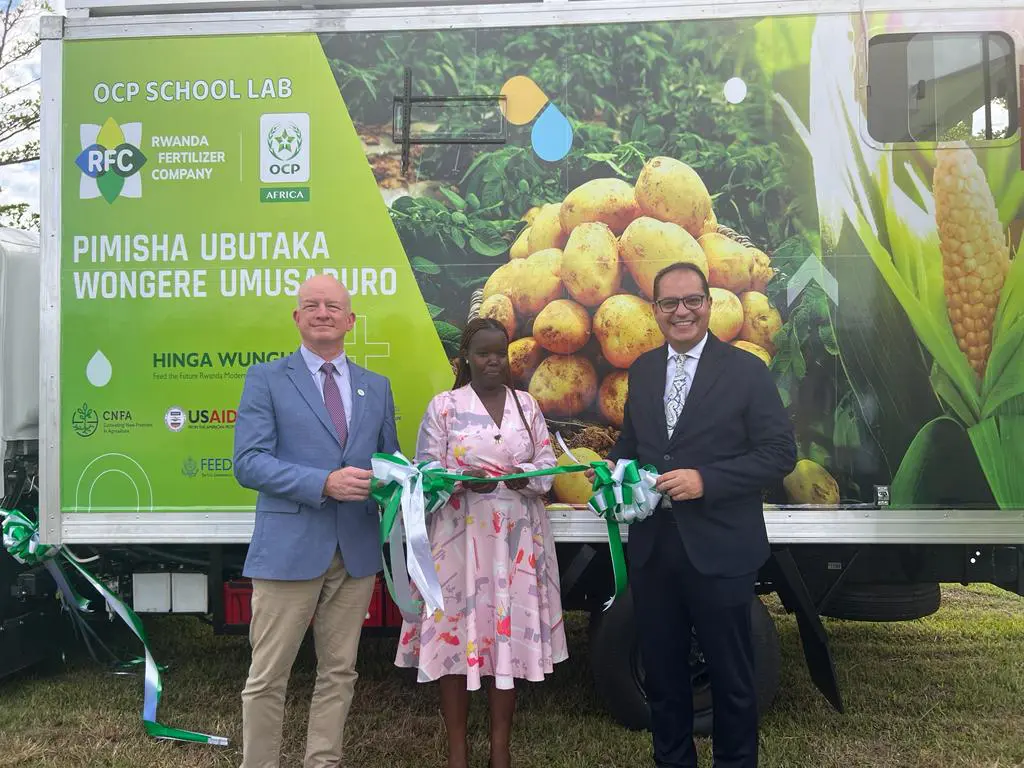The partnership is part of OCP Africa's plans to strengthen and enhance the capabilities of African farmers, including production.
As part of its long-standing efforts to support smallholder farmers on the African continent, OCP Africa signed a new Memorandum of Understanding with Cultivating New Frontiers in Agriculture (CNFA) and Rwanda Fertilizer Company (RFC) on Thursday in Kigali.
The agreement aims to promote the “use of agro-inputs and increase market access for more than 180,000 smallholder farmers in the agricultural value chain,” OCP Africa announced in a statement.
According to the statement, the agreement also covers the launch of the OCP School Lab, a body that aims to allow 30,000 farmers to receive training in "good agricultural practices" over a period of one year.
The lab's campaign, targeting dozens of villages in 14 districts, aims to provide farmers with recommendations on the use and benefits of fertilizers.
OCP Africa, which is part of the Moroccan fertilizer giant OCP Group, has been insisting on the importance of fertilizers and their benefits for healthy and productive soil.
In January, OCP chief Mostapha Terrab underlined Africa's potential to become the world's farm.
“To maximize yield per acre, it is estimated that local farmers will have to increase their fertilizer application tenfold,” he said.
Terrab stressed that the use of fertilizers in a sustainable way will be crucial.
«Doing it sustainably – without long-term environmental damage – will be crucial. Not only for the continent, but also for the world,” Terrab added.
The association also aims to pave the way for farmers by providing them with a roadmap on the use, access and benefits of fertilizers. This is intended for farmers to benefit from an increase in production to satisfy the demand for their products.
“Through the MoU, farmers will benefit from improved practices and systemic approaches to agriculture that address all the challenges they face and will be helped to enhance innovation and entrepreneurship in the agricultural value chain,” OCP Africa added.
The OCP also emphasized the importance of the initiative, which aims to benefit 150,000 more farmers through Farmer House, another program that is evolving towards training young leaders in rural areas, as well as vulnerable communities of women farmers.
The training project will consist of facilitating access to quality agricultural inputs, small machinery, training services and promoting local innovation.
Commenting on the partnership, OCP Africa Director General Mohammed Anouar Jamali stressed that the agreement is part of a joint effort that aims to address the challenges faced by farmers to “ensure increased yields and incomes”.
Daniel Gies, party leader of the USAID-funded Hinga Wunguke activity, also highlighted the importance of the partnership, stressing that this approach is part of innovative initiatives that benefit smallholder farmers "so that they can participate in competitive markets and grow." profitably."
On the same day of the signing of the MoU agreement, USAID and CNFA, as well as the Rwanda Fertilizer Company, launched an OCP School Laboratory Project, which was launched in partnership with the Rwanda Ministry of Agriculture.
“Leading farmers from various districts attended the official launch in Murindi of the OCP SCHOOL LAB to experience high-tech soil-based fertilizer recommendations, yield target and crop nutrition,” stated OCP Africa.
During the launch, farmers met professionals and experts in the field, who shared their knowledge and experience to enable farmers to enhance their farming experience.
Since its inception in 2016, OCP Africa has stepped up its efforts to help support the continent's farmers. The group's school labels have benefited 770,000 farmers in nine African countries, including Nigeria, Togo, Ghana, Guinea, Ivory Coast, Kenya, Burkina Faso, Senegal and Tanzania.
Source: MoroccoWorldNews






